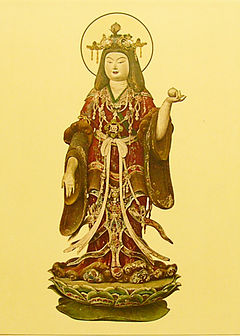Loading AI tools
Japanese female deity From Wikipedia, the free encyclopedia
Kisshōten (吉祥天, lit. "Auspicious Heavens"), also known as Kichijōten, Kisshoutennyo (吉祥天女), or Kudokuten (功徳天), is a Japanese female deity, adapted via Buddhism from the Hindu goddess Lakshmi. Kisshoutennyo is sometimes named as one of the Seven Gods of Fortune (fukujin), replacing either Jurōjin or Fukurokuju.[1] For example, in the 1783 edition of the Butsuzōzui compendium (reprinted in 1796), Kichijōten replaces Fukurokuju as one of the seven fukujin.[2] She is considered to be the goddess of happiness, fertility, and beauty.[1][3][4] Kisshoutennyo's iconography is distinguished by the Nyoihōju gem (如意宝珠) in her hand,[5] Kisshōten and the Nyoihōju gem are both represented by the symbol of the kagome.
| Śrīmahādevī (Buddhism) | |
|---|---|
 | |
| Sanskrit | श्रीमहादेवी Śrīmahādevī |
| Chinese | 吉祥天 (Pinyin: Jíxiáng tiān) |
| Japanese | 吉祥天 or 吉祥天
(romaji: Kichijōten) |
| Korean | 길상천
(RR: Gilsang Cheon) |
| Tagalog | Slimahadevi |
| Tibetan | ལྷ་མོ་ཆེན་མོ་དཔལ།་ Wylie: lha mo chen mo dpal |
| Vietnamese | Cát Tường Thiên |
| Information | |
| Venerated by | Mahāyāna, Vajrayāna |
When Kisshoutennyo is counted among the seven fukujin[2] and fellow Fukujin Daikoku is regarded in feminine form,[6] all three of the Hindu Tridevi goddesses are represented in the Fukujin, with Daikoku representing Parvati and Benzaiten representing Saraswati.
Seamless Wikipedia browsing. On steroids.
Every time you click a link to Wikipedia, Wiktionary or Wikiquote in your browser's search results, it will show the modern Wikiwand interface.
Wikiwand extension is a five stars, simple, with minimum permission required to keep your browsing private, safe and transparent.